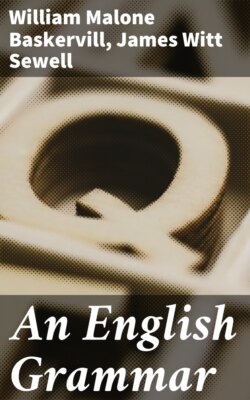Читать книгу An English Grammar - James Witt Sewell - Страница 13
На сайте Литреса книга снята с продажи.
II. Gender shown by Suffixes.
ОглавлениеTable of Contents
29. By far the largest number of gender words are those marked by suffixes. In this particular the native endings have been largely supplanted by foreign suffixes.
Native suffixes.
The native suffixes to indicate the feminine were -en and -ster. These remain in vixen and spinster, though both words have lost their original meanings.
The word vixen was once used as the feminine of fox by the Southern-English. For fox they said vox; for from they said vram; and for the older word fat they said vat, as in wine vat. Hence vixen is for fyxen, from the masculine fox.
Spinster is a relic of a large class of words that existed in Old and Middle English,[1] but have now lost their original force as feminines. The old masculine answering to spinster was spinner; but spinster has now no connection with it.
The foreign suffixes are of two kinds:—
Foreign suffixes. Unaltered and little used.
(1) Those belonging to borrowed words, as czarina, señorita, executrix, donna. These are attached to foreign words, and are never used for words recognized as English.
Slightly changed and widely used.
(2) That regarded as the standard or regular termination of the feminine, -ess (French esse, Low Latin issa), the one most used. The corresponding masculine may have the ending -er (-or), but in most cases it has not. Whenever we adopt a new masculine word, the feminine is formed by adding this termination -ess.
Sometimes the -ess has been added to a word already feminine by the ending -ster; as seam-str-ess, song-str-ess. The ending -ster had then lost its force as a feminine suffix; it has none now in the words huckster, gamester, trickster, punster.
Ending of masculine not changed.
30. The ending -ess is added to many words without changing the ending of the masculine; as—
baron—baroness
count—countess
lion—lioness
Jew—Jewess
heir—heiress
host—hostess
priest—priestess
giant—giantess
Masculine ending dropped.
The masculine ending may be dropped before the feminine -ess is added; as—
abbot—abbess
negro—negress
murderer—murderess
sorcerer—sorceress
Vowel dropped before adding -ess.
The feminine may discard a vowel which appears in the masculine; as in—
actor—actress
master—mistress
benefactor—benefactress
emperor—empress
tiger—tigress
enchanter—enchantress
Empress has been cut down from emperice (twelfth century) and emperesse (thirteenth century), from Latin imperatricem.
Master and mistress were in Middle English maister—maistresse, from the Old French maistre—maistresse.
31. When the older -en and -ster went out of use as the distinctive mark of the feminine, the ending -ess, from the French -esse, sprang into a popularity much greater than at present.
Ending -ess less used now than formerly.
Instead of saying doctress, fosteress, wagoness, as was said in the sixteenth century, or servauntesse, teacheresse, neighboresse, frendesse, as in the fourteenth century, we have dispensed with the ending in many cases, and either use a prefix word or leave the masculine to do work for the feminine also.
Thus, we say doctor (masculine and feminine) or woman doctor, teacher or lady teacher, neighbor (masculine and feminine), etc. We frequently use such words as author, editor, chairman, to represent persons of either sex.
NOTE.—There is perhaps this distinction observed: when we speak of a female as an active agent merely, we use the masculine termination, as, "George Eliot is the author of 'Adam Bede;'" but when we speak purposely to denote a distinction from a male, we use the feminine, as, "George Eliot is an eminent authoress."
